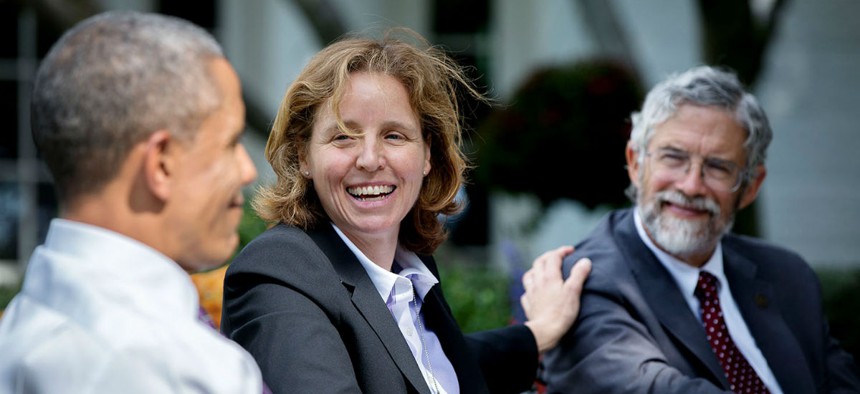Report: Want Innovation? Hire and Empower CTOs

President Barack Obama talks with Megan Smith, U.S. Chief Technology Officer, and Dr. John Holdren, Director of the Office of Science and Technology Policy, during a technology strategy discussion in the Rose Garden of the White House, Oct. 8, 2014. Pete Souza/White House
Chief technology officers should be empowered to deliver new solutions and approaches.
The federal government isn’t making the most of its chief technology officers and is missing out on significant technological innovation, according to a report published by the Professional Services Council.
Titled “Ensuring the Effectiveness of Federal Chief Technology Officers,” the study found about two-thirds of the CFO Act agencies have CTOs, but their job descriptions, duties and reporting structures vary greatly across government, and most aren’t empowered to actually deliver innovation.
“Federal agency CTOs have the opportunity to make a profound difference,” said Robin Lineberger of Deloitte, in a press statement. “With the right job description and organizational placement, the CTO position can be leveraged as the change agent to bring innovation and new technologies into government.”
» Get the best federal technology news and ideas delivered right to your inbox. Sign up here.
Lineberger led the study with PSC Innovation Committee co-chair Casey Coleman of Unisys.
The study found CTOs in government handle a wide range of tasks, including fostering innovation, managing enterprise architecture and data, coordinating between offices, acting as a tech adviser and managing an agency’s tech workforce. The organizational relationship between CTOs and chief information officers tends to occur in one of three ways: Either the CTO has a dual-hat role as the CIO, is a direct report to the CIO, or has an independent report.
The study advocates specifically for empowered CTOs who report directly to CIOs, “ensuring alignment, partnership on key initiatives and agency goals, accountability and much-needed collaboration to avoid working on what could otherwise be competing priorities and paths forward that would result in fragmentation and silos of innovation.”
In other words, CTOs ought to be among the cadre of a federal CIO’s key deputies, who may include chief information security officers, chief data officers and others. CTOs, too, should keep the private sector’s tech pulse. In this way, CTOs could be one of the key cogs in government’s effort to keep pace with industry.
“The importance of fostering dialogue between agency CTOs and industry cannot be overstated,” Coleman said. “If we expect agencies to adapt to the rapid pace of technological change, CTOs will have to be in the vanguard of delivering new solutions and approaches.”
In its recommendations, the study calls on the federal government to follow suit, moving the U.S. CTO role from the White House Office of Science and Technology Policy to the Office of Management and Budget, working under the U.S. CIO.
Under the recommendations, the U.S. CTO would chair a CTO council composed of federal CTOs and other innovation agents across agencies like the National Science Foundation, the National Institute of Standards and Technology, and the Intelligence Advanced Research Projects Activity.
The study makes clear these changes could be made solely with executive branch leadership and do not require new legislation. However, if legislation is desired, the study recommendations simply amending the Federal Information Technology Acquisition Reform Act “to address the skills, experience and priorities for CTOs—aligned with CIOs and able to leverage CIO authorities and resources.”
CTOs are relatively new positions in government, and despite ambiguity across agencies with what they actually do, the study suggests CTOS aren’t just a tech leadership du jour.
“Despite currently lacking the statutory backing and organizational structure that federal chief information officers enjoy, agency CTOs are nonetheless making important in-roads in the adoption of new technologies,” said David Wennergren, PSC executive vice president for operations and technology, in a statement. “We look forward to continuing the partnership with industry in implementing the report’s recommendations so that the federal government can fully reap the benefits of the digital age.”
EDITOR’S NOTE: Frank Konkel will moderate a panel with PSC Innovation Committee co-chairs Casey Coleman and Robin Lineberger and several federal CTOs at PSC’s Tech Trends conference on Sept. 21 in Arlington, Virginia. For more information or to register, visit PSC’s website.
NEXT STORY: OPM Touts Upgrades to Federal Jobs Site






